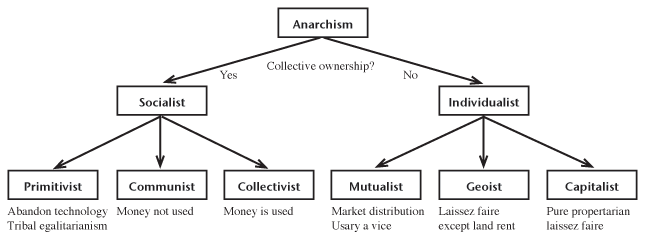| Against Authority | page 15 |
|

Left to right it goes from least propertarian to most propertarian. Anarcho-primitivism is not really an economic school, as primitive tribalism is its main thrust, but in economic theory it is identical to anarcho-communism. The main difference between the communist school (associated with Peter Kropotkin) and the collectivist school (founded by Michael Bakunin) is the position on money. The communists favor a "gift economy" without money; the collectivist may still use money, but in the form of labor notes rather than commodity receipts.
Mutualists are commonly considered more socialist than capitalist. This assessment seems quite mistaken. The index shows that mutualists are in substantial agreement with propertarianism, and are closely akin to anarcho-capitalists. Probably mistyping mutualism as a kind of socialism is due to historical reasons, in particular the change in meaning for the term "socialism" that occurred during the 20th century. In the 19th century, anyone who had a plan to make society better was a socialist. Later, it came to mean opposition to concentration of wealth in the hands of the few. Thus individualist anarchists like Benjamin Tucker called themselves "socialist." Today socialism is usually defined as collective control of the means of production (capital goods.) By this modern definition, mutualists are not socialist, as they favor private ownership (sticky or possession) of the means of production.
Geoism (also called "Georgism" after its founder Henry George) is the most esoteric form of anarchism at this time. Only a handful of people call themselves geoanarchists - most geoists are minarchist rather than anarchist. However, geoism has an influence on other schools, particularly mutualist anarchism and the environmentalist schools. Minarchists tend to like the "single-tax" ground rent idea as arguably a non-aggressive way to fund their night-watchman state. Environmentalists often see ground rent as a solution to the tragedy of the commons and a way to make mining and logging firms pay society for their exploitation of resources and pollution.